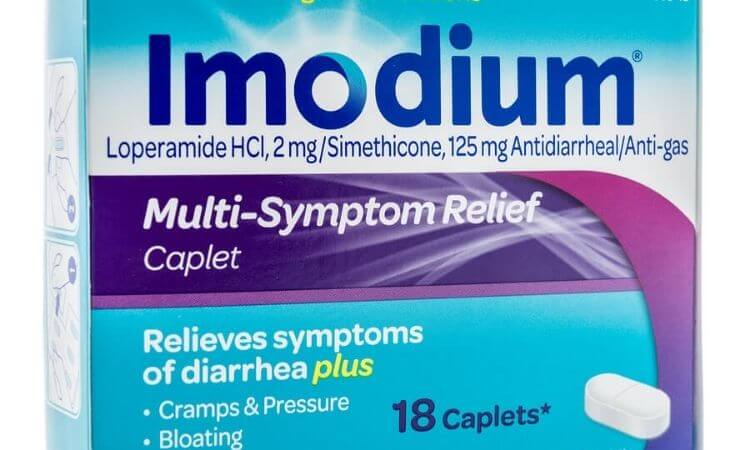
Imodium (loperamide) is an over-the-counter medication treatment for acute and chronic diarrhea. When used in large quantities, however, Imodium can induce effects similar to opioids, such as euphoria. For this reason, some individuals suffering from opioid addiction abuse Imodium to get high or help manage withdrawal symptoms.
Loperamide works by reducing the flow of fluids and electrolytes into the bowel, effectively decreasing the frequency of bowel movements. The medication can be found in tablet, capsule, or liquid solution for oral consumption.
Imodium Side Effects
Using Imodium can help regulate bowel movements and reduce dehydration in people who are experiencing severe, acute, or chronic diarrhea. However, in addition to these desirable results, abuse of this medication has been associated with a variety of adverse and potentially harmful effects as well. These side effects can vary from mild to severe and may include any of the following:
- Dry mouth
- Flatulence
- Stomach cramps
- Dizziness
- Drowsiness
- Nausea
- Vomiting
- Headache
- Constipation
- Problems urinating
Why Abuse Has Become Prevalent
Like many drugs, the risk that adverse effects will occur is increased when the drug is abused, and an excessive amount is ingested. Abuse of the medication has risen sharply within the past decade, and health officials are blaming the opioid epidemic as the primary catalyst for this problem.
People have discovered that when used in very high doses, Imodium can cause effects similar to those of opioids. The medication is, indeed, believed to be an opioid agonist, and therefore, has the potential to induce euphoric feelings. Due to the drug’s chemical structure, it cannot cross the blood-brain barrier in low doses. Moreover, it will not produce a high unless used in excessive amounts or in conjunction with other drugs.
Also, the drug is widely available OTC at pharmacies and, when compared to both illicit and prescription opioids, it is very affordable. In fact, the cost of 200 capsules of generic loperamide can be as low as $10. People who abuse the drug may take anywhere from 50-400 pills in a single day to experience euphoria comparable to that of opioids like oxycodone and heroin.
Overall, Imodium’s accessibility, low cost, and legal status all contribute to its high potential for abuse. Additionally, many people use loperamide to relieve withdrawal symptoms associated with opioid use. Rather than utilizing loperamide to mimic the euphoric high of opioids, people use the drug to treat physical dependence on opioids. For this reason, loperamide abuse has been referred to as “poor man’s methadone.”
Unfortunately, using Imodium as replacement therapy for opioids also requires the user to take very high doses of the medication, which can result in an overdose. Consuming large and frequent amounts of loperamide places a person at a high risk of developing cardiac arrhythmias and profound central respiratory depression, which can lead to death.

Signs of Imodium Abuse and Addiction
There is a popular misconception that because loperamide is available without a prescription, it’s safe to use or abuse. However, this belief is not true and can be dangerous. High doses of any drug that has psychoactive effects can lead to the development of chemical dependence if chronically abused. Even a person who has taken higher-than-recommended doses of loperamide due to gastrointestinal issues or diarrhea can become accustomed to the drug’s effects on his or her system and develop a dependence.
After a chemical dependence has developed, users will encounter unpleasant withdrawal symptoms when they try to quit using the drug. These symptoms are similar to those related to opioid withdrawal and may include nausea, vomiting, depression, irritability, anxiety, cramps, diarrhea, profuse sweating, and muscle aches and pains.
Addiction is characterized by both dependence and compulsive drug-seeking behavior. People who become addicted will continue using Imodium despite encountering adverse consequences. They may also use it in combination with other substances to achieve a more intense high. Alcohol is often abused with Imodium because each substance amplifies the effects of the other.
Unfortunately, engaging in polydrug use significantly increases the chance of a life-threatening overdose due to the possibility of cardiac problems or profound central nervous system depression.
NOTE: When compared to Morphine, Imodium has been shown to be 40-50 times more effective at producing antidiarrheal and central nervous system (CNS) depressant effects.
Help for Imodium Abuse or Opioid Addiction
All drugs, even those that are OTC, can be hazardous when not used as directed. Using Imodium to get high or to relieve opioid withdrawal symptoms other than diarrhea is a form of drug misuse.
If you are abusing loperamide or are using the drug to treat opioid dependence, we urge you to call Midwood Addiction Treatment as soon as possible to discuss treatment options. We employ a comprehensive approach for the treatment of substance abuse and addiction that can help you get on the path to a clean, drug-free life.
Are you ready to take that first step? If so, we are here to help!